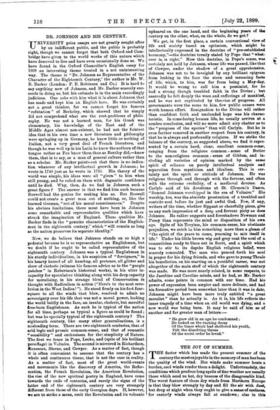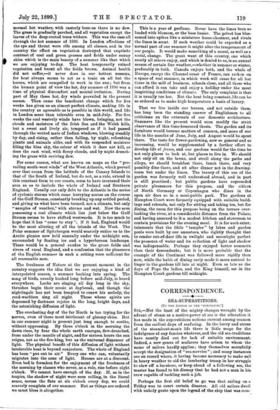THE JOY OF SUMMER.
THE factor which has mule the present summer of the century the most enjoyable in the memory of man has been the quality of the wind. Hot winds make summer heats a burden, cool winds render them a delight. Unfortunately, the conditions which produce long spells of fine weather are usually those which send us hot, dry breezes of the disagreeable kind. The worst feature of these dry winds from Northern Europe is that they blow strongly by day and fill the air with dust, but drop at night when they ought to give a sensed coolness, for easterly winds always fall at sundown ; also in this
normal hot weather, with easterly breezes there is no dew. The grass is gradually parched, and all vegetation except the leaves of the deep-rooted trees withers. This was the case all through the hot summer of 1896. In London affections of the eye and throat were rife among all classes, and in the country the effect on vegetation destroyed that exquisite contrast of cool and green grasses and fields under sunny skies which is the main beauty of a summer like that which we are enjoying to-day. The heat temporarily rained vegetation and burnt all the fields brown. Animal health did not suffer,—it never does in our hottest seasons, for heat always seems to act as a tonic on all but the horses, which are compelled to work in the stm ; but from the human point of view the hot, dry summer of 1896 was a time of physical discomfort and mental irritation. During part of May these hot, dry winds prevailed in the present season. Then came the beneficent change which for five weeks has given us an almost perfect climate, making life in the country as agreeable as is possible in this world, and life in London more than tolerable even in mid-July. For five weeks the cool westerly winds have blown, bringing, not the clouds and moisture of the Irish Sea and the Welsh hills, but a sweet and lively air, tempered as if it had passed through the wetted mats of Indian windows, blowing steadily by day, and rising, rather than falling, by night, refreshing plants and animals alike, and with its suspended moisture filling the blue sky, the colour of which it does not kill, as does the east wind, with fleecy clouds, and by night drench- ing the grass with reviving dew.
For some reason, what are known on maps as the "pre- vailing south-west winds" of the West Atlantic, which prevail over that ocean from the latitude of the Canary Islands to that of the South of Ireland, but do not, as a rule, extend in this constant form to our coasts, seem to have increased their area so as to include the whole of Ireland and Southern England. Usually our only debt to the Atlantic is the series of cyclonic storms which come hurrying across on the course of the Gulf Stream, constantly breaking up any settled period, and giving us what have been termed, not a climate, but only "samples of weather," with storms and wet. Now the area possessing a real climate which lies just below the Gulf Stream seems to have shifted westwards. It is too much to hope that it has "come to stay "; if it had, England would be the most alluring of all the islands of the West. The Polar summer of Spitzbergen would scarcely entice us to the Arctic picnics now held annually under the midnight sun, surrounded by floating ice and a hyperborean landscape. There would be a general exodus to the green fields and rivers of rural England, and a confession that the pleasures of the English summer in such a setting were sufficient for all reasonable men.
The freshness of Nature at the present moment in the country suggests the idea that we are enjoying a kind of interpolated season, a slimmer backing into spring. The song of birds, usually hushed long before mid-July, is beard everywhere. Larks are singing all day long in the sky, thrushes begin their music at daybreak, and though the nightingale has not been tempted to renew his melody, the reed-warblers sing all night. Those whose spirits are depressed by darkness rejoice in the long, bright days, and the astonishing diffusion of light.
The everlasting day of the far North is too trying for the nerves, even of those most intolerant of gloomy skies. But in our summer night is present just long enough to soothe, without oppressing. By three o'clock in the morning the dawn rises, by four the whole earth emerges, dew-drenched, from under the mantle of night, and for sixteen hours the sun reigns, not as the fire-king, but as the universal dispenser of light. The physical benefit of this diffusion of light without intolerable heat is beyond conjecture. The whole of England has been "put out to air." Every one who can, voluntarily migrates into the zone of light. Houses are at a discount. Even bed is forsaken for the enjoyment of the freshness of the morning by classes who never, as a rule, rise before eight o'clock. We cannot have enough of the day. If, as in the tropics, the shadow of night were seen rolling, in the literal sense, across the fiats at six o'clock every day, we could scarcely complain of our summer. But as things are ordered we must bless it altogether. This is a year of perfume. Never have the limes been so loaded with blossom, or the bees busier. The privet has blos- somed into spikes like a miniature horse-chestnut, and rivals the limes in scent. If such weather could be expected as a normal part of our summer it might alter the temperament of our people. It would make something of a moral, as well as a social, change. The great want of this country, one which nearly all others enjoy, and which is denied to us, is an annual season of certain fine weather,—whether in summer or winter, preferably in both. Canada enjoys both, and the whole of Europe, except the Channel coast of France, can reckon on a apace of real summer, in which work will cease for all but those in the mill of business, schools close, and all those who can afford it can take and enjoy a holiday under the most inspiriting conditions of climate. The only complaint is that it is usually too hot. But the heat being constant, life can be so ordered as to make high temperature a basis of luxury.
That we live inside our houses, and not outside them, has long been the standing answer of Englishmen to all criticisms on the externals of our domestic architecture. Summers like the present would soon modify the strict observance of this time-honoured thesis. The garden and its furniture would become matters of concern, and more of our life in the months of June, July, and August would be spent there. The taste for flower-gardening, now so general and so increasing, would be supplemented by a further effort to develop life al fresco, and our gardens would for the time be not only places to look at, but places to live in. We should not only sit on the lawns, and stroll along the paths and alleys, we should breakfast there, lunch there, and very possibly dine there, and sit after dinner not in the drawing- room but under the limes. The luxury of this use of the garden was formerly well understood abroad, and in part is still practised ; but public gardens have superseded private pleasances for this purpose, and the citizen of North Germany or Copenhagen who dines in the open air does so in a semi-public park. The gardens at Hampton Court were formerly equipped with suitable build- ings and retreats, not only for sitting and taking tea, but for dining, the room for this purpose being on the terrace over- looking the river, at a considerable distance from the Palace, and having annexed to it a modest kitchen and storeroom to contain provisions for the evening meal. It is for such enter_ tainments that the little " temples " by lakes and garden pools were built by our ancestors, who rightly thought that to render out-of-door life in twilight and moonlight perfect the presence of water and its reflection of light and shadow was indispensable. Perhaps they enjoyed hotter summers than their descendants; but it is more probable that the example of the Continent was followed more rigidly than now, while the habit of dining early made it more natural to linger in the gardens till late at night. Even as late as the days of Pope the ladies, and the King himself, sat in the Hampton Court gardens till midnight.



































 Previous page
Previous page